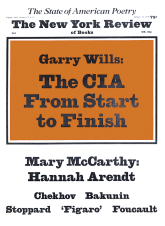In response to:
Victims from the January 23, 1975 issue
To the Editors:
What happened to me is undoubtedly a miracle. A few months ago, sitting on a cot in Cell 196 of the Leningrad KGB, I could not imagine that I would soon be walking around Rome, swimming in the Tyrrhenian Sea, and that my desk would be heaped with marvelous Russian books that would get one a sentence of about twenty years hard labor. Of course, the miracle was a man-made one, and I am obliged for it to everyone in the West who came to my defense. Only their public statements liberated me (and many others before me). There is even proof of this: in the first place only a month before my trial, at the termination of the investigation, they planned quite a different denouement for my case; and in the second place, after the trial, in March, those who lecture to the Leningrad Regional Party Committee, commenting on my case at the meetings which are obligatory in such instances, said—and I quote, “In view of the international situation it was profitable for us to show humanity.” Thank God the international situation exists! I am deeply grateful to all who defended me.
For anyone who has been in the KGB prison the sum-total is always negative. While I did get free, I left all my manuscripts there—more than fifteen years work—they refused to return them to me. The poor papers will certainly serve out my suspended sentence. But even this is not too bad, a few of them ended up in the West before all this, and while I was resting in the inner sanctum of the Big House, one of my stories appeared in Kontinent, and in America my first book in my life was published by Ardis in Ann Arbor. I scarcely need to express the joy I felt in Vienna when I got the magazine and the book. But for me the saddest thing lies elsewhere: the state is getting more and more serious about considering poetry, stories and novels its enemies. We managed to recover Brodsky’s poems, they were returned to my wife and not mentioned at the trial. But Lolita, for example, which they took during the search of my artment, was pronounced outside the law. They didn’t put it on trial—but they did destroy it. They burned Lolita; I was shown the papers concerning it and saw the smoke from the chimney when I was walking in the courtyard. And that, in essence, is an endlessly sad thing.
Vladimir Maramzin
Rome
This Issue
January 22, 1976



